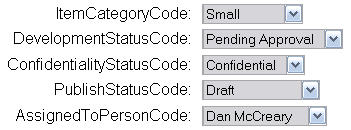XRX/选择列表生成器
外观
< XRX
您希望将所有代码表存储在中心位置,并让每个表单动态地从这些代码表生成选择列表。
我们将创建一个非常简单的XML文件格式来存储所有代码。我们将每个文件存储一个代码表,然后编写一个简单的XQuery,它遍历所有这些文件以构建一个示例选择列表。此选择列表将在模型中创建一个实例以保存每个选择列表值。它还将使用列表中的第一个值填充该实例。
在我们的示例中,我们将假设一个XRX文件命名标准,例如/db/apps/app-name/code-tables/my-code-table.xml,其中每个应用程序包含其自己的代码表,以最大限度地提高应用程序在系统之间的可移植性。共享代码表的应用程序可以将这些代码表存储在以下位置:/db/shared/code-tables/my-code-table.xml

<code-table>
<code-table-name>PublishStatusCode</code-table-name>
<definition>A way to classify the publishing workflow of an item.</definition>
<items>
<item>
<label>Draft</label>
<value>draft</value>
</item>
<item>
<label>Under Review</label>
<value>under-review</value>
</item>
<item>
<label>Published</label>
<value>published</value>
</item>
</items>
</code-table>
此查询遍历XRX应用程序code-tables集合中的所有文件,并查找以code-table为根元素的XML文件。然后它创建一个包含所有选择列表的报告,这些选择列表位于一个正在运行的XForms应用程序中。
xquery version "1.0";
import module namespace style ='http://code.google.com/p/xrx/style' at '/db/xrx/modules/style.xqm';
declare namespace xhtml="http://www.w3.org/1999/xhtml";
(: XQuery to construct an XForm for either a new item or update item :)
declare option exist:serialize "method=xhtml media-type=application/xhtml+xml indent=yes";
let $app-collection := style:app-base-uri()
let $code-table-collection := concat($app-collection, '/code-tables')
let $code-tables := collection($code-table-collection)/code-table
return
<html xmlns="http://www.w3.org/1999/xhtml"
xmlns:xf="http://www.w3.org/2002/xforms"
xmlns:ev="http://www.w3.org/2001/xml-events">
<head>
<title>XForms Selection List Tester</title>
{style:import-css()}
<link type="text/css" rel="stylesheet" href="block-form.css"/>
<xf:model>
<!-- This instance holds the value of each code -->
<xf:instance xmlns="" id="save-data" src="">
<data>
{for $code-table in $code-tables
return
element {$code-table/code-table-name/text()} {$code-table/items/item[1]/value/text()}}
</data>
</xf:instance>
</xf:model>
</head>
<body>
{style:header()}
{style:breadcrumb()}
<h1>Sample with a Model in the XForm</h1>
{for $code-table in $code-tables
let $code-table-name := $code-table/*:code-table-name/text()
return
<xf:select1 ref="{$code-table-name}">
<xf:label>{$code-table-name}: </xf:label>
{for $item in $code-table/*:items/*:item
return
<xf:item>
<xf:label>{$item/*:label/text()}</xf:label>
<xf:value>{$item/*:value/text()}</xf:value>
</xf:item>}
<xf:hint>{$code-table/*:definition/text()}</xf:hint>
</xf:select1>
}
{style:footer()}
</body>
</html>
请注意,此XQuery使用元素构造器在实例中创建元素名称。它还使用*:name表示法将来自空命名空间的数据直接放入XForms命名空间。
此文件还将元素的定义直接放入XForms应用程序的命中信息中。在某些XForms应用程序(如Firefox)中,提示信息会以浮动短暂模式显示在表单的左侧边距中。
这是可以用来使每个选择出现在单独一行上的block-form.css文件
@namespace xf url("http://www.w3.org/2002/xforms");
body {font-family: Arial, Helvetica; sans-serif;}
/* This line ensures all the separate input controls appear on their own lines */
xf|output, xf|input, xf|select, xf|select1, xf|textarea {display:block; margin:5px 0;}
/* Makes the labels right aligned in a column that floats to the left of the input controls. */
xf|select > xf|label,
xf|select1 > xf|label
{text-align:right; padding-right:10px; width:250px; float:left;}
